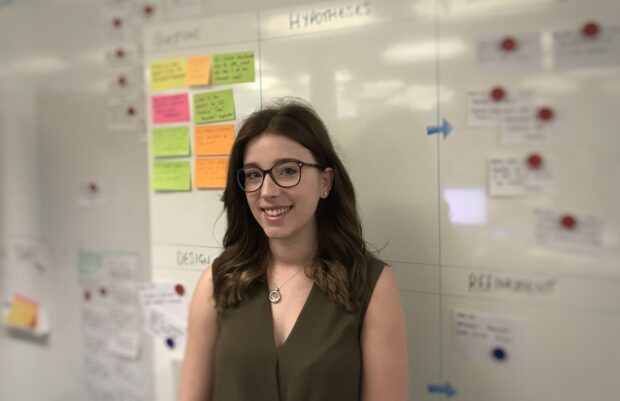
Over the past 2 years it’s been my responsibility to understand how we can support people at a really difficult time of their life. I’m a user researcher working on the DWP Bereavement Service.
Bereavement Support Payment was introduced in April 2017. We were tasked with designing both the internal system to allow colleagues to pay people, and the information and communications to allow people to make a claim. Our team vision is to:
‘Empower people to get the bereavement payment they're entitled to quickly, easily and via the channel that suits them best’.
We put the user at the heart of the service by conducting research with people who have been bereaved, to understand their experiences and how we can make our services better meet their needs. People can often find it difficult to remember one particular part of that process as it can be completely overwhelming, so our aim is to understand the wider bereavement journey, not just one specific part. We use the experiences that people share to improve the wider service design of the bereavement journey as a whole.
Things to consider for users
Before we go out and conduct our actual research we do a little bit of preparation work to provide the best environment for our research. We need to remember that some people might not discuss the subject of bereavement with their friends or family and we are privileged that they’ll share their experience with us.
Speaking about bereavement can make people feel particularly vulnerable so we need to ensure that we make them feel as comfortable as possible by being considerate and careful with both the people we’re speaking to, ourselves and our team members.
Location is key, because we’re asking people to open up about an extremely personal experience, so we need to make sure that they feel at ease in their surroundings. Some people prefer a private quiet space. Others prefer a busier environment with people around. Some appreciate a cuppa and a chat. The key is ensuring the user is comfortable and their privacy is respected.
We always let people know that they can stop the session at any point without providing a reason. This helps to build trust by creating an understanding environment where they are sharing personal experiences with us because they feel able to and trust us, and not because they feel as though they’ve already made a commitment.
Several people that I’ve spoken to have expressed relief in telling their story to someone who hasn’t been personally involved, often because they just want to tell someone what happened and how it made them feel without interruption.
Things to consider for team members
Bereavement isn’t something that everyone has dealt with. For those of us that have, hearing other people’s experiences can often make us think of our own. It’s just as important to look after ourselves and our teams as it is the service users that we are speaking to.
Preparation is important to ensure that team members who come along to the research sessions are primed and debriefed - as sessions can often get emotional. We work in multi-disciplinary teams consisting of several different roles, so it can be really helpful to get non-user researchers involved. I try to encourage conversations about the content and outcome to make sure the team feel comfortable discussing such an emotive subject.
But it’s also necessary to advise observers from the wider team that the user may not feel comfortable if they are present. This can be disappointing for team members who are keen to engage in the research but is paramount to ensuring the user’s wishes are fully respected. Having team members involved helps them to empathise with our users and begin to understand the wealth of emotions that they are facing at the time, but we also have to make a judgement on when this is appropriate. We also need to take care of ourselves as individuals and understand when we, and others need to take a step back.
We’ve built a strong research community, which means that we can provide each other with the support and advice we need to make sure that we can do our job to the best of our ability. We’ve also spent time as a team on resilience and well-being training to equip ourselves with techniques we can use should we need to.
I feel extremely humbled as a user researcher that people are willing to open up to me and share their experiences so that they can contribute to improving services for others. It’s important that we make things as easy as possible for people at what can be the worst point in their lives.
We’re recruiting now
Check out our vacancies on our Careers site. You can also find out more about what’s happening in DWP Digital by subscribing to this blog and following us on Twitter @DWPDigital and @DWPDigitalJobs.

5 comments
Comment by Seán Massey posted on
Great blog Mel, such an important part of our work; making sure our services work meet the needs of the most vulnerable
Comment by Davinder Shinder posted on
Great blog, particularly the cycle of research to include help and advice for those carrying out the research, we can all have empathy and learn to do a fantastic job as public servants keeping the client at the heart of any Issues and improvements but it is even more holistic when learning to help yourself and having support and guidance to do so. This provides another level of learning that can only make the end result more honest and robust in creating a system that does the job the way it is meant to do.
Comment by Kevin O'Neill posted on
Vital work Mel. Thank you for writing about how you go about this in a sensitive, thoughtful and people-centred way.
Comment by Izzy Johnson posted on
Very interesting blog, thank you for sharing your experiences.
Comment by Sharron Wise posted on
Great blog Mel Getting other team members involved in the UR really does help put the user at the heart of everything we do. Thank you for sharing